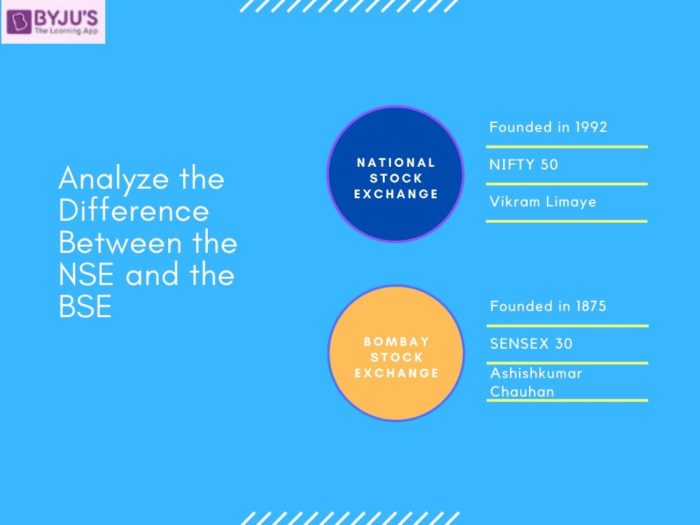India’s two main stock exchanges are the Bombay Stock Exchange (BSE) and National Stock Exchange (NSE). These two are among Asia’s largest stock exchange surpassed only by the stock exchanges of Japan and China
The Bombay Stock Exchange is one of Asia’s oldest stock exchange, beginning operations on July 9, 1875, as “The Native Share & Stock Brokers Association”.
The National Stock Exchange is India’s biggest stock exchange in terms of market capitalization. Its operation beginning in 1992, it was the first exchange to bring in fully automated trading to India.

Although they are both Indian stock exchanges there are some fundamental differences between the two that this article will attempt to highlight within the context of the IAS Exam
Aspirants can find more Difference Between Articles, by visiting the linked page
The difference between NSE and BSE is given in the table below:
Differences between NSE and BSE
| NSE |
BSE |
| It is one of the biggest stock exchanges India along with being a harbinger of technological advances by the introduction of fully automated trading systems | The BSE is one of Asia’s oldest stock exchange markets which offers a legacy of high-speed trading |
| As electronic trading was incorporated from the beginning of its establishment, it always has been a fully electronic stock exchange promoting paperless trade | Only in 1995 did BSE switch to electronic trading after following a paper trading pattern since 1875. |
| In the global stock exchange rankings, NSE stands at the 11th Position | The BSE stands at 10th position in the global stock exchange rankings |
| The NSE has the lead in this segment as it has monopolized it. | BSE enjoys far lower volumes among investors and traders alike |
| The NSE has more than 1600 companies listed under it | The BSE has more than 5000 companies listed under it. |
| NSE’s Stock Index – NIFTY – gives top 50 stock index | BSE’s Stock Index – SENSEX gives top 30 stock index |
| NSE was recognized as a stock exchange in 1993 | BSE became a recognized stock exchange in 1957 |
| NSE promotes trading in equity, debts and currency derivatives | BSE promotes trading in debt instruments, mutual funds and currencies |
| Mr Vikram Limaye is the Managing Director and CEO | Mr Ashishkumar Chauhan the Managing Director and CEO. |
Both the National Stock Exchange and the Bombay Stock Exchange are covered under the Economy segment of the UPSC Exams. Aspirants can find study materials related to this segment with the links given below:
- Major Stock Exchanges in India
- Securities and Exchange Board of India
- Strategy and Syllabus for UPSC Economics
- Notes for UPSC Indian Economy
Difference Between NSE and BSE – Download PDF Here
Frequently Asked Questions on Difference Between NSE and BSE
Q 1. What is the difference between NSE and BSE?
Q 2. What are the stock index for BSE and NSE?
Q 3. What is the difference between NIFTY and SENSEX?
Q 4. What is SEBI’s role in BSE and NSE?
Candidates can find the general pattern of the UPSC Exams by visiting the UPSC Syllabus page. For more articles and exam-related preparation materials, refer to the links given in the table below:
Related Links


Comments